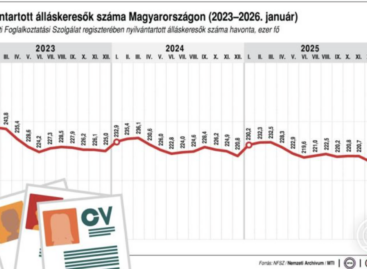Sándor Baja: “It is much less important for Hungarian workers what their job actually involves than for their European counterparts”
Trade magazin’s Business Podcast continues
Sándor Baja, managing director of Randstad Hungary, Czech Republic and Romania was Szilvia Krizsó’s guest in the latest episode of the Future Talks podcast. This article features excerpts from their conversation, but you can watch the full interview at futuretalks.hu.
This article is available for reading in Trade magazin 2024/12-2025/01
– What do policymakers and companies have to prepare for in the labour market?

Sándor Baja, managing director of
Randstad Hungary, Czech Republic and Romania
– There seem to be lots of parallel trends. They must be prepared to replace the workforce in an ageing society with the help of robotics, AI and immigration. Our surveys show that today in Hungary the majority of people think AI will help them in their work.
– One of your surveys reveals that most Hungarians believe: if they don’t keep training, they could lose their job in 5 years. How much do they learn and train themselves?
– In Hungary a large part of workers could find a job or do work with a bigger added value with relatively little re-training. Unfortunately there is a lack of such re-training programmes today – I am sure that we could give hundreds of thousands of people a job that would earn them much more money and therefore generate more added value and increase the GDP for the country.
– What do you do to keep your knowledge fresh?
– I read a lot and I am a keen language learner as well, so I am learning Romanian now, because I am working in Romania. I really enjoy the fact that I can be successful easily, having mastered French and Russian.
– You are also responsible for the Czech Republic and Romania. How are those labour markets different from ours?
– In Romania the workforce is very mobile, with millions of people working in Western Europe, mainly in Spain, Italy, Germany and the UK. Another interesting fact is that they learn English and German more easily, their language skills are much better. I really like the fact that people love to work in Romania. In our country the dynamics of the economy offer very few opportunities. The Czech Republic has the advantage of being geographically closer to Western Europe and the SME sector manufactures products with a high added value.

The future of the modern world is to keep people in the the labour market churn
– Which HR trends can be used to draw conclusions about what to expect in 5-10-15 years?
– In the last few years there has been such a workforce shortage that companies are now more keen to have a long-term workforce, and they are letting go of flexibility and the ability to downsize and recruit quickly. The majority of people want to be paid every month, in the long term, so they obviously want permanent work. Nowadays, temporary work is less frequent and the number of permanent has contracts increased, so the role of job agencies is now more important.
– I still don’t understand where the workforce has gone. There are plenty of people aged 50, 60, 70 or even 80 who are at the top of their game and want to work. Why can’t companies find them?
– You are right. A 55-year-old person doesn’t have a baby at home and today’s 55 year olds are in good physical shape, they have IT knowledge, so they could be employed. That said, a lot of companies back off when they find out the age of the candidate – and not only in Hungary.
Related news
(HU) Török Dávid: Misszióm, hogy megváltoztassam az ingatlanosok imázsát
🎧 Hallgasd a cikket: Lejátszás Szünet Folytatás Leállítás Nyelv: Auto…
Read more >Related news
II. Green Gastronomy – Marketing Communication Workshop organized by the MMSZ HoReCa and Green Section
🎧 Hallgasd a cikket: Lejátszás Szünet Folytatás Leállítás Nyelv: Auto…
Read more >








